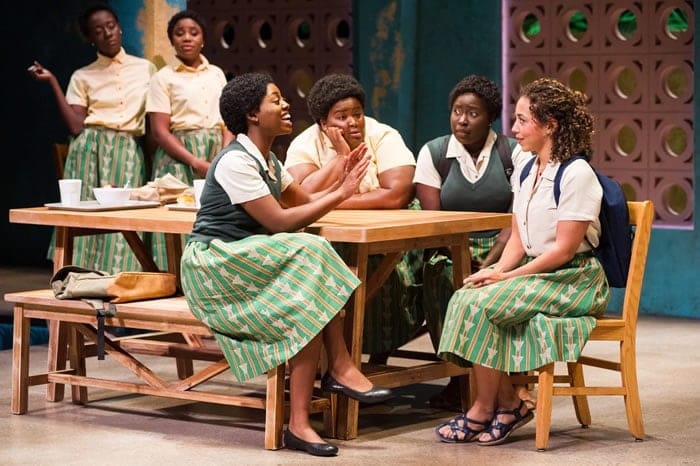Community, Leadership, Experimentation, Diversity, & Education
Pittsburgh Arts, Regional Theatre, New Work, Producing, Copyright, Labor Unions,
New Products, Coping Skills, J-O-Bs...
Theatre industry news, University & School of Drama Announcements, plus occasional course support for
Carnegie Mellon School of Drama Faculty, Staff, Students, and Alumni.
CMU School of Drama
Thursday, October 10, 2019
School Girls: or, the African Mean Girls Play. Funny for African-Americans, but what is it saying to White audiences?
DC Theatre Scene: As the stage lights brightened on Jocelyn Bioh’s School Girls or the African Mean Girls Play, I was immediately taken back to my primary and secondary school days in Lagos, Nigeria. The button up shirt and calf-length skirt school uniform sewn from fabric that seemed specifically chosen to be as unflattering as possible, the polished black shoes, thick accents, wooden tables and chairs in the cafeteria, and the school bell, the start of School Girls felt like an authentic ode to my upbringing. All that was missing was a tie and neatly cornrowed hair. Bioh in the first ten seconds had managed to capture sixteen years of my life. I was in awe.
Subscribe to:
Post Comments (Atom)

4 comments:
Growing up in Lagos, Nigeria like the author I can definitely relate to the experiences the author of the article has and colorism is a big issue in the continent. It is amazing to see the effect that whiteness even has on countries like Nigeria whose population is highly made up of black people. As a result, Nigeria is one of the highest consumers of bleaching products because women are made to feel insecure because of how dark their skin is. In secondary school, people with darker skin tones are given mean nicknames or made fun of. I have not read or seen this play but I have always been intrigued by it. I am glad that it is an avenue for an important conversation that plagues a lot African countries. I would be interested in seeing a production of this play that takes out the comedy aspect of it or see a talk back with the audience and ask what they got from watching the play.
At first, when I clicked on this article, I was ready for a white person, bent out of shape about POC getting roles on stage. This article was very insightful and interesting, and it made me think a lot. For a play to be about colorism within the POC community, being consumed by mostly white people you can't help but wonder what message they are receiving and digesting. I am an east Asian woman, and colorism is a huge issue within the Asian community. It is so sad that POC women feel like they must degrade each other and discriminate against each other in order to gain favor from white people. I am a strong believer Women of Color need to stand up for one another, and stand behind and next to one another. This is the only way to combat racism and sexism together. Having typically Western European features does not make somebody for beautiful. I have been a victim to this mindset myself. Skin whitening, rhinoplasty, and double-eyelid surgery are more common than not in East Asia, and is the expectation at this point. The pressure to look as White as possible is heavy. I wish all Girls of Color knew they are beautiful in the skin they were born in.
I would personally love to see this play. I am a light-skinned, half black, half Mexican woman. I can remember specific times when I was a little girl wishing that I had lighter skin or straighter hair. Being white would make me pretty, and looking how I did and still do was ugly. Being older and looking back on those specific moments, it makes me sad. It saddens me to know that many girls and boys of all ages have felt through history and still feel to this day that being anything other than white or pale-skinned makes them ugly or less desirable. I think that a play such as School Girls is important in order to spread the message that having darker skin does not make you less pretty or special as someone with lighter skin. As for the predominantly white audience mentioned by the author, I am concerned as to what message they are receiving from the play. Do they understand the gravity that colorism holds on the lives of POCs? Or do they only see it as a comedic play about high school drama?
I am very excited for this show to take off and go to audiences around the country because it is highly important and a very compelling story that needs to be told. With shows like "Ruined" by Lynn Nottage, the only stories you ever hear about African girls is one of tragedy, misogyny, and disease, Mean girls captures African girls in a light that isn't typically shown on stage and tells a story that is nuanced and not driven by some form of victimization. It deals with issues that are more human, like colorism and racism on a smaller scale. The show creates an environment where it's safe to speak about these issues in a way that is more productive way without fear of turning into a stereotype. As plays like these are continuing to be produced, its highly imperative for directors and designers to be vigilant of the attention that needs to be paid to African Cultures that are representative of more than just a stereotype.
Post a Comment